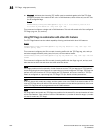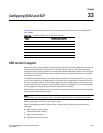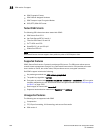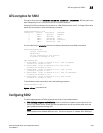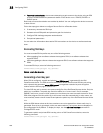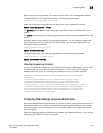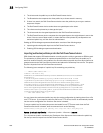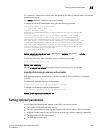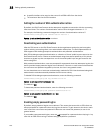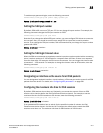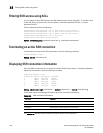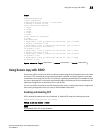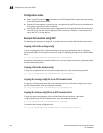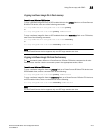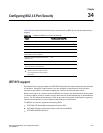
1210 PowerConnect B-Series FCX Configuration Guide
53-1002266-01
Setting optional parameters
33
• A specific interface to be used as the source for all SSH traffic from the device
• The maximum idle time for SSH sessions
Setting the number of SSH authentication retries
By default, the Dell PowerConnect device attempts to negotiate a connection with the connecting
host three times. The number of authentication retries can be changed to between 1 – 5.
For example, the following command changes the number of authentication retries to 5.
PowerConnect(config)#ip ssh authentication-retries 5
Syntax: ip ssh authentication-retries <number>
Deactivating user authentication
After the SSH server on the Dell PowerConnect device negotiates a session key and encryption
method with the connecting client, user authentication takes place. The Dell implementation of
SSH supports DSA challenge-response authentication and password authentication.
With DSA challenge-response authentication, a collection of clients’ public keys are stored on the
Dell PowerConnect device. Clients are authenticated using these stored public keys. Only clients
that have a private key that corresponds to one of the stored public keys can gain access to the
device using SSH.
With password authentication, users are prompted for a password when they attempt to log into the
device (provided empty password logins are not allowed). If there is no user account that matches
the user name and password supplied by the user, the user is not granted access.
You can deactivate one or both user authentication methods for SSH. Note that deactivating both
authentication methods essentially disables the SSH server entirely.
To disable DSA challenge-response authentication, enter the following command.
PowerConnect(config)#ip ssh key-authentication no
Syntax: ip ssh key-authentication yes | no
The default is yes.
To deactivate password authentication, enter the following command.
PowerConnect(config)#ip ssh password-authentication no
Syntax: ip ssh password-authentication no | yes
The default is yes.
Enabling empty password logins
By default, empty password logins are not allowed. This means that users with an SSH client are
always prompted for a password when they log into the device. To gain access to the device, each
user must have a user name and password. Without a user name and password, a user is not
granted access.
If you enable empty password logins, users are not prompted for a password when they log in. Any
user with an SSH client can log in without being prompted for a password.



